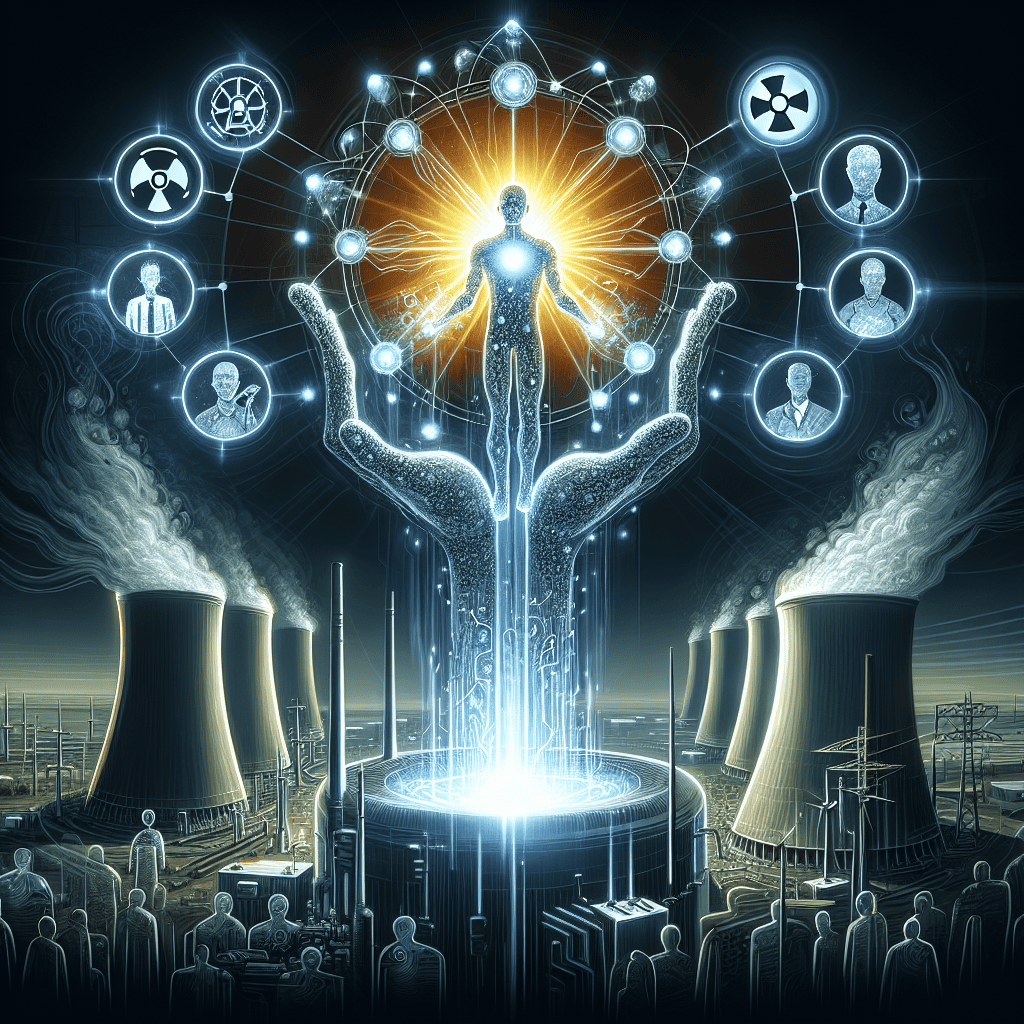“AI Sparks a Nuclear Renaissance: 7 Stocks Poised for Power Surge”
Introduction
In recent years, the intersection of artificial intelligence and energy production has sparked a transformative wave across the nuclear power sector, leading to significant advancements and investment opportunities. As AI-driven technologies enhance operational efficiencies, safety protocols, and predictive maintenance, nuclear power stocks are experiencing a notable surge. This momentum is fueled by the global push for cleaner energy solutions and the need to meet rising electricity demands sustainably. Investors are increasingly turning their attention to key players in the nuclear industry that are leveraging AI to optimize their operations and drive growth. Here, we explore seven prominent companies at the forefront of this AI-driven energy revolution, poised to capitalize on the burgeoning market dynamics and deliver substantial returns.
Impact Of AI On The Nuclear Energy Sector
The integration of artificial intelligence (AI) into the nuclear energy sector is revolutionizing the industry, leading to a significant surge in nuclear power stocks. This transformation is driven by AI’s ability to enhance operational efficiency, improve safety measures, and optimize energy production. As the world increasingly seeks sustainable and reliable energy sources, nuclear power, bolstered by AI advancements, is gaining renewed attention. Consequently, investors are keenly observing the market, identifying key players poised to benefit from this technological evolution.
AI’s impact on the nuclear energy sector is multifaceted. Firstly, AI algorithms are being employed to predict equipment failures before they occur, thereby reducing downtime and maintenance costs. This predictive maintenance capability is crucial in an industry where safety and reliability are paramount. By analyzing vast amounts of data from sensors and historical records, AI systems can identify patterns and anomalies that human operators might overlook. This not only enhances the safety of nuclear plants but also extends the lifespan of critical components, leading to more efficient operations.
Moreover, AI is playing a pivotal role in optimizing nuclear reactor performance. Through machine learning models, operators can simulate various scenarios and adjust parameters to maximize energy output while minimizing waste. This optimization is essential as it allows nuclear plants to operate at peak efficiency, contributing to a more sustainable energy grid. Additionally, AI-driven analytics provide insights into fuel consumption and waste management, further enhancing the environmental benefits of nuclear power.
In light of these advancements, several companies are emerging as key players in the AI-driven nuclear energy landscape. These companies are leveraging AI technologies to innovate and improve their operations, making them attractive prospects for investors. Among these, Westinghouse Electric Company stands out for its pioneering efforts in integrating AI into reactor design and maintenance. Similarly, Framatome is utilizing AI to enhance its digital instrumentation and control systems, ensuring safer and more efficient plant operations.
Another notable player is General Electric, which is incorporating AI into its nuclear division to streamline processes and reduce operational costs. Meanwhile, Rolls-Royce is focusing on small modular reactors (SMRs), using AI to optimize their design and deployment. This approach not only reduces the initial capital investment but also offers greater flexibility in meeting energy demands.
Furthermore, the collaboration between AI technology firms and nuclear companies is fostering innovation. For instance, partnerships between tech giants like IBM and nuclear operators are driving the development of advanced AI solutions tailored to the industry’s unique challenges. These collaborations are crucial in accelerating the adoption of AI technologies and ensuring their successful integration into nuclear operations.
As the nuclear energy sector continues to evolve, the role of AI will undoubtedly expand, offering new opportunities for growth and development. Investors are advised to keep a close watch on these key players, as their strategic use of AI could significantly influence the future of nuclear power. In conclusion, the AI-driven energy surge is not only boosting nuclear power stocks but also paving the way for a more efficient, safe, and sustainable energy future. As the world grapples with the challenges of climate change and energy security, the synergy between AI and nuclear power presents a promising solution, underscoring the importance of continued investment and innovation in this dynamic field.
Top AI Innovations Driving Nuclear Power Growth
The integration of artificial intelligence (AI) into the energy sector has ushered in a transformative era, particularly for nuclear power, which is experiencing a significant resurgence. This AI-driven energy surge is not only enhancing the efficiency and safety of nuclear power plants but also boosting the stocks of key players in the industry. As the world grapples with the dual challenges of meeting rising energy demands and reducing carbon emissions, AI innovations are proving to be pivotal in driving the growth of nuclear power. This article explores the top AI innovations that are propelling this growth and highlights seven key players in the nuclear power sector that are benefiting from these advancements.
To begin with, AI is revolutionizing the way nuclear power plants operate by optimizing their performance and ensuring safety. Machine learning algorithms are being employed to predict equipment failures before they occur, thereby reducing downtime and maintenance costs. This predictive maintenance capability is crucial for nuclear power plants, where unplanned outages can be both costly and dangerous. Furthermore, AI systems are enhancing the precision of reactor control, allowing for more efficient fuel use and reducing waste. These improvements not only increase the economic viability of nuclear power but also contribute to its sustainability.
In addition to operational enhancements, AI is playing a critical role in the design and construction of new nuclear facilities. Advanced simulation tools powered by AI are enabling engineers to model complex nuclear reactions with unprecedented accuracy. This capability allows for the design of safer and more efficient reactors, which can be built faster and at a lower cost. As a result, companies that are leveraging these AI-driven design tools are gaining a competitive edge in the market.
Moreover, AI is facilitating the integration of nuclear power into the broader energy grid. By analyzing vast amounts of data from various energy sources, AI systems can optimize the distribution of electricity, ensuring that nuclear power is used effectively alongside renewable sources like wind and solar. This integration is essential for creating a balanced and resilient energy system that can meet the demands of a low-carbon future.
As these AI innovations continue to drive the growth of nuclear power, several companies are emerging as key players in the industry. Among them, Westinghouse Electric Company is at the forefront, utilizing AI to enhance reactor safety and efficiency. Similarly, Framatome is leveraging AI to improve the design and maintenance of its reactors. Another notable player, General Electric, is integrating AI into its nuclear operations to optimize performance and reduce costs.
Additionally, Rolls-Royce is making strides with its small modular reactors, which benefit from AI-driven design and operational efficiencies. Meanwhile, Rosatom is employing AI to advance its nuclear technology and expand its global footprint. In the United States, NuScale Power is pioneering the development of AI-enhanced small modular reactors, which promise to revolutionize the nuclear power landscape. Lastly, China National Nuclear Corporation is harnessing AI to bolster its position as a leader in nuclear technology.
In conclusion, the AI-driven energy surge is significantly boosting nuclear power stocks by enhancing the efficiency, safety, and integration of nuclear energy into the global power grid. As AI continues to evolve, it will undoubtedly play an increasingly vital role in shaping the future of nuclear power, making it a key component of the world’s transition to a sustainable energy future. Investors and industry stakeholders would do well to keep a close eye on these seven key players as they navigate this rapidly changing landscape.
Key Players In The AI-Driven Nuclear Power Market
The integration of artificial intelligence (AI) into the nuclear power sector is revolutionizing the industry, leading to a significant surge in nuclear power stocks. This technological advancement is not only enhancing operational efficiency but also improving safety measures, thereby attracting substantial investor interest. As AI continues to reshape the landscape, several key players are emerging as frontrunners in this AI-driven nuclear power market.
Firstly, Westinghouse Electric Company stands out as a pioneer in incorporating AI into nuclear operations. By leveraging machine learning algorithms, Westinghouse is optimizing reactor performance and predictive maintenance, reducing downtime and operational costs. This strategic use of AI is positioning Westinghouse as a leader in the nuclear power renaissance, making it a compelling stock to watch.
Similarly, Framatome, a French multinational, is making significant strides in AI applications within nuclear facilities. The company is focusing on AI-driven data analytics to enhance the safety and efficiency of nuclear reactors. By predicting potential failures and optimizing fuel usage, Framatome is not only ensuring operational excellence but also contributing to the sustainability of nuclear energy. This innovative approach is likely to bolster investor confidence and drive stock performance.
In the United States, General Electric (GE) is another key player harnessing AI to transform nuclear power. GE’s digital solutions are integrating AI to monitor reactor conditions in real-time, enabling swift responses to any anomalies. This proactive approach is enhancing the reliability of nuclear power plants, thereby increasing their appeal to investors seeking stable returns in the energy sector.
Moreover, Rolls-Royce is making notable advancements in the AI-driven nuclear power market. The company’s focus on small modular reactors (SMRs) is complemented by AI technologies that streamline design and operational processes. By reducing construction times and costs, Rolls-Royce is positioning itself as a competitive force in the nuclear industry, attracting attention from investors eager to capitalize on the growing demand for clean energy solutions.
In addition to these established players, several emerging companies are also making waves in the AI-driven nuclear power market. NuScale Power, for instance, is at the forefront of developing SMRs with integrated AI systems. These systems are designed to enhance safety protocols and operational efficiency, making NuScale a promising contender in the nuclear power sector.
Furthermore, TerraPower, backed by notable investors such as Bill Gates, is leveraging AI to innovate nuclear reactor designs. By focusing on advanced reactor technologies and AI-driven safety measures, TerraPower is poised to make a significant impact on the future of nuclear energy. This forward-thinking approach is likely to attract investors looking for cutting-edge solutions in the energy market.
Lastly, the Canadian company, SNC-Lavalin, is utilizing AI to improve the lifecycle management of nuclear facilities. By integrating AI into maintenance and operational strategies, SNC-Lavalin is enhancing the longevity and efficiency of nuclear power plants. This comprehensive approach is expected to drive investor interest and boost the company’s stock performance.
In conclusion, the AI-driven energy surge is propelling nuclear power stocks to new heights, with key players like Westinghouse, Framatome, GE, Rolls-Royce, NuScale Power, TerraPower, and SNC-Lavalin leading the charge. As these companies continue to innovate and integrate AI into their operations, they are not only transforming the nuclear power industry but also offering lucrative opportunities for investors seeking to capitalize on the future of clean energy.
How AI Is Revolutionizing Nuclear Power Operations

The integration of artificial intelligence (AI) into nuclear power operations is revolutionizing the industry, offering unprecedented opportunities for efficiency, safety, and innovation. As AI technologies continue to advance, they are increasingly being employed to optimize various aspects of nuclear power generation, from predictive maintenance to operational efficiency. This technological surge is not only enhancing the performance of nuclear facilities but also driving significant interest in nuclear power stocks. Investors are keenly observing the market, eager to identify key players poised to benefit from this AI-driven transformation.
One of the primary ways AI is impacting nuclear power operations is through predictive maintenance. By leveraging machine learning algorithms, nuclear facilities can analyze vast amounts of data generated by sensors and monitoring equipment. This analysis enables the early detection of potential equipment failures, allowing for timely maintenance and reducing the risk of unplanned outages. Consequently, this predictive capability not only enhances the reliability of nuclear power plants but also extends the lifespan of critical components, thereby reducing operational costs.
Moreover, AI is playing a crucial role in optimizing the operational efficiency of nuclear reactors. Advanced algorithms can simulate various operational scenarios, enabling operators to make informed decisions that maximize energy output while minimizing fuel consumption. This optimization is particularly important as the demand for clean and sustainable energy sources continues to grow. By improving the efficiency of nuclear power generation, AI contributes to the broader goal of reducing carbon emissions and combating climate change.
In addition to operational efficiency, AI is enhancing the safety protocols within nuclear facilities. Machine learning models can analyze historical data to identify patterns and anomalies that may indicate potential safety risks. This proactive approach to safety management allows operators to address issues before they escalate, thereby ensuring the continued safe operation of nuclear power plants. Furthermore, AI-driven simulations and virtual reality training programs are providing plant personnel with realistic scenarios to practice emergency response procedures, further bolstering safety measures.
As AI continues to reshape the nuclear power industry, several companies are emerging as key players in this transformative landscape. These companies are at the forefront of integrating AI technologies into their operations, positioning themselves as leaders in the field. Among them, Westinghouse Electric Company is leveraging AI to enhance its reactor design and maintenance processes. Similarly, Framatome is utilizing AI to improve the efficiency and safety of its nuclear services. Additionally, companies like Rolls-Royce and General Electric are investing in AI-driven solutions to optimize their nuclear power offerings.
Furthermore, smaller firms such as NuScale Power and TerraPower are also making significant strides in incorporating AI into their advanced reactor designs. These companies are focusing on developing innovative nuclear technologies that promise to deliver safer and more efficient energy solutions. Finally, the collaboration between AI technology providers and nuclear power companies is fostering a dynamic ecosystem that is driving the industry forward.
In conclusion, the integration of AI into nuclear power operations is ushering in a new era of efficiency, safety, and innovation. As the industry continues to evolve, the role of AI will undoubtedly become even more integral, offering exciting opportunities for growth and development. Investors and industry stakeholders alike are closely monitoring the advancements in this field, eager to capitalize on the potential benefits that AI-driven solutions can bring to nuclear power. As such, the companies leading this charge are well-positioned to shape the future of energy generation, making them key players to watch in the coming years.
Investment Opportunities In AI-Enhanced Nuclear Stocks
The integration of artificial intelligence (AI) into the energy sector has sparked a significant transformation, particularly within the realm of nuclear power. As the world increasingly seeks sustainable and efficient energy solutions, AI-driven advancements are propelling nuclear power into a new era of innovation and efficiency. This technological surge has not only enhanced operational capabilities but also captured the attention of investors, leading to a notable boost in nuclear power stocks. In this context, several key players have emerged as frontrunners in leveraging AI to optimize nuclear energy production, presenting compelling investment opportunities.
To begin with, AI’s role in nuclear power is multifaceted, encompassing predictive maintenance, safety enhancements, and operational efficiency. By employing machine learning algorithms, nuclear facilities can predict equipment failures before they occur, thereby minimizing downtime and reducing maintenance costs. This predictive capability is crucial in an industry where safety and reliability are paramount. Consequently, companies that are at the forefront of integrating AI into their operations are gaining a competitive edge, attracting investor interest.
Among these companies, one notable player is Westinghouse Electric Company. With a rich history in nuclear technology, Westinghouse is leveraging AI to enhance the safety and efficiency of its reactors. By utilizing AI-driven analytics, the company is able to optimize fuel usage and improve reactor performance, thereby reducing operational costs and increasing profitability. This strategic use of AI positions Westinghouse as a key contender in the nuclear power sector, making it an attractive option for investors seeking exposure to AI-enhanced energy solutions.
Similarly, Framatome, a French multinational, is making significant strides in AI integration. The company is focused on developing AI systems that enhance the safety protocols of nuclear reactors. By implementing advanced machine learning models, Framatome aims to predict and mitigate potential safety risks, ensuring the highest standards of operational safety. This proactive approach not only bolsters the company’s reputation but also enhances its appeal to investors prioritizing safety and innovation.
In addition to these established players, smaller companies are also making waves in the AI-driven nuclear landscape. NuScale Power, for instance, is pioneering the development of small modular reactors (SMRs) that incorporate AI for enhanced efficiency and safety. These compact reactors are designed to be more flexible and cost-effective, appealing to a broader range of energy markets. NuScale’s innovative approach and commitment to AI integration make it a promising investment opportunity in the evolving nuclear sector.
Furthermore, Rolls-Royce Holdings is another key player to watch. Known for its engineering prowess, Rolls-Royce is applying AI to optimize the design and operation of its nuclear reactors. By harnessing AI, the company aims to reduce construction costs and improve the overall efficiency of its reactors, thereby enhancing its competitive position in the market.
As the nuclear power industry continues to evolve, the role of AI is set to become increasingly pivotal. Companies that successfully integrate AI into their operations are likely to experience enhanced performance and profitability, making them attractive prospects for investors. In this dynamic landscape, Westinghouse Electric Company, Framatome, NuScale Power, and Rolls-Royce Holdings stand out as key players poised to capitalize on the AI-driven energy surge. As such, investors seeking to tap into the potential of AI-enhanced nuclear stocks would do well to keep a close eye on these industry leaders.
Future Trends In AI And Nuclear Energy Collaboration
The intersection of artificial intelligence (AI) and nuclear energy is rapidly transforming the landscape of the energy sector, offering promising advancements that are capturing the attention of investors and industry leaders alike. As AI technologies continue to evolve, they are increasingly being integrated into nuclear power operations, enhancing efficiency, safety, and sustainability. This synergy is driving a surge in nuclear power stocks, with several key players emerging as frontrunners in this innovative collaboration.
To begin with, AI’s ability to process vast amounts of data with precision and speed is revolutionizing the way nuclear plants operate. By employing machine learning algorithms, nuclear facilities can optimize their operations, predict maintenance needs, and improve safety protocols. This not only reduces operational costs but also minimizes the risk of human error, which is crucial in an industry where safety is paramount. Consequently, companies that are at the forefront of integrating AI into their nuclear operations are seeing a significant boost in their stock performance.
Among these companies, one notable player is Westinghouse Electric Company. Known for its pioneering role in nuclear technology, Westinghouse is leveraging AI to enhance its reactor designs and improve fuel efficiency. By utilizing AI-driven analytics, the company is able to extend the lifespan of its reactors while maintaining high safety standards. This strategic use of AI is positioning Westinghouse as a leader in the nuclear energy sector, attracting considerable interest from investors.
Similarly, EDF Energy, a major player in the global nuclear market, is harnessing AI to streamline its operations. The company is implementing AI solutions to monitor reactor conditions in real-time, allowing for proactive maintenance and reducing downtime. This approach not only ensures a steady supply of energy but also enhances the overall reliability of nuclear power, making EDF Energy a key stock to watch in this burgeoning field.
Another significant contributor to the AI-driven energy surge is General Electric (GE). With its extensive experience in both AI and energy sectors, GE is uniquely positioned to capitalize on this trend. The company is developing AI-powered tools to optimize nuclear plant performance, focusing on predictive maintenance and operational efficiency. As a result, GE’s innovative approach is garnering attention from investors looking to capitalize on the future of energy.
In addition to these established players, smaller companies like NuScale Power are also making waves. NuScale is at the forefront of developing small modular reactors (SMRs), which are seen as a more flexible and cost-effective alternative to traditional nuclear reactors. By integrating AI into their SMR designs, NuScale is enhancing safety features and operational efficiency, making it a promising investment opportunity in the nuclear energy sector.
Furthermore, the collaboration between AI and nuclear energy is not limited to traditional power companies. Tech giants like IBM are also entering the fray, offering AI solutions tailored for the nuclear industry. IBM’s expertise in AI and data analytics is being utilized to develop advanced monitoring systems that enhance the safety and efficiency of nuclear plants. This cross-industry collaboration is indicative of the growing importance of AI in shaping the future of nuclear energy.
As the world continues to seek sustainable and reliable energy sources, the integration of AI into nuclear power operations presents a compelling solution. The companies leading this charge are not only advancing the capabilities of nuclear energy but are also providing lucrative opportunities for investors. As AI-driven innovations continue to unfold, these key players are set to play a pivotal role in the future of energy, making them essential stocks to watch in the coming years.
Challenges And Solutions In AI-Driven Nuclear Power
The integration of artificial intelligence (AI) into the nuclear power sector has sparked a significant transformation, offering both opportunities and challenges. As AI-driven technologies become increasingly pivotal in optimizing nuclear power operations, the industry faces a complex landscape that requires careful navigation. The primary challenge lies in ensuring the safety and reliability of nuclear power plants while implementing AI systems. Nuclear facilities are inherently high-risk environments, and the introduction of AI necessitates rigorous testing and validation to prevent any potential malfunctions that could lead to catastrophic consequences. Therefore, the development of robust AI algorithms that can accurately predict and mitigate risks is crucial.
Moreover, the integration of AI into nuclear power systems demands substantial investment in infrastructure and training. The existing workforce must be equipped with the necessary skills to operate and maintain AI-driven technologies. This requires comprehensive training programs and a shift in the educational focus towards interdisciplinary studies that combine nuclear engineering with data science and AI. Additionally, the financial burden of upgrading existing infrastructure to accommodate AI technologies can be significant, posing a challenge for many nuclear power companies.
Despite these challenges, AI offers promising solutions that can enhance the efficiency and safety of nuclear power plants. One of the most significant advantages of AI is its ability to process vast amounts of data in real-time, enabling predictive maintenance and reducing downtime. By analyzing data from sensors and other monitoring devices, AI systems can identify potential issues before they escalate, allowing for timely interventions. This not only improves the operational efficiency of nuclear power plants but also extends their lifespan, providing a substantial return on investment.
Furthermore, AI can play a crucial role in optimizing the fuel cycle in nuclear reactors. By accurately modeling and simulating nuclear reactions, AI can help in designing more efficient fuel assemblies, reducing waste, and enhancing the overall sustainability of nuclear power. This capability is particularly important as the industry seeks to address environmental concerns and transition towards cleaner energy sources.
In addition to operational improvements, AI-driven technologies can also enhance the security of nuclear power plants. Advanced AI systems can monitor and analyze security data to detect potential threats and vulnerabilities, providing an additional layer of protection against cyberattacks and other security breaches. This is especially critical in an era where cyber threats are becoming increasingly sophisticated and prevalent.
As the nuclear power industry continues to evolve with the integration of AI, several key players are emerging as leaders in this transformation. Companies that are investing in AI research and development, as well as those forming strategic partnerships with technology firms, are well-positioned to capitalize on the benefits of AI-driven energy solutions. These companies are not only enhancing their operational capabilities but also gaining a competitive edge in the market.
In conclusion, while the integration of AI into the nuclear power sector presents several challenges, it also offers innovative solutions that can significantly enhance the efficiency, safety, and sustainability of nuclear power plants. By addressing the challenges of safety, infrastructure, and workforce training, the industry can harness the full potential of AI to drive a new era of growth and innovation. As AI-driven technologies continue to advance, the nuclear power sector is poised to play a pivotal role in the global transition towards cleaner and more sustainable energy sources.
Q&A
1. **Question:** What is driving the recent surge in nuclear power stocks?
– **Answer:** The surge is driven by AI-driven energy solutions optimizing nuclear power operations and increasing efficiency.
2. **Question:** How is AI impacting the nuclear power industry?
– **Answer:** AI is enhancing predictive maintenance, optimizing energy output, and improving safety protocols in nuclear power plants.
3. **Question:** Which company is a leading player in AI-driven nuclear power technology?
– **Answer:** General Electric (GE) is a key player, leveraging AI to enhance nuclear power plant operations.
4. **Question:** What role does AI play in predictive maintenance for nuclear power plants?
– **Answer:** AI analyzes data to predict equipment failures, reducing downtime and maintenance costs.
5. **Question:** Name a company that is innovating with AI in nuclear energy safety.
– **Answer:** Rolls-Royce is using AI to improve safety measures and risk assessment in nuclear facilities.
6. **Question:** How does AI contribute to optimizing energy output in nuclear plants?
– **Answer:** AI algorithms adjust operational parameters in real-time to maximize energy efficiency and output.
7. **Question:** Which company is focusing on AI to enhance nuclear power plant design?
– **Answer:** Westinghouse Electric Company is utilizing AI to innovate and improve nuclear reactor designs.
Conclusion
The recent surge in nuclear power stocks, driven by advancements in AI technology, highlights a transformative period for the energy sector. AI’s role in optimizing nuclear operations, enhancing safety protocols, and improving efficiency has attracted significant investor interest. Key players benefiting from this trend include industry leaders such as NextEra Energy, Exelon Corporation, and Duke Energy, alongside innovative companies like NuScale Power and TerraPower. As AI continues to revolutionize energy management and production, these companies are well-positioned to capitalize on the growing demand for sustainable and reliable energy solutions, making them crucial to watch in the evolving energy landscape.





